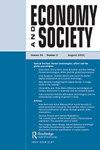The ‘government of men’: Moving beyond Foucault’s binaries
IF 4.3
2区 社会学
Q1 ECONOMICS
引用次数: 0
Abstract
AbstractRecent controversies surrounding Michel Foucault suggest tensions and unresolved issues in his unfinished work. Here we interrogate Foucault’s legacy in relation to his claim that the welfare-state is a secularization of the Christian pastorate. We challenge Foucault’s binary narrative of the Christian flock versus the Graeco-Roman citizen and expand the focus to other ‘technologies of power’ in medieval Islam. Rather than an outburst of governmentality in modernity, we suggest a transregional and longue durée history of which the Christian pastorate was merely one facet. This non-binary framework indicates that Foucault’s claim of a ‘demonic’ fusion of sovereign and pastoral power in modern politics requires significant revisitation. Finally, we claim that Foucault’s much-discussed fascination with neoliberalism may have roots in this one-sided narrative regarding the birth of the welfare-state.Keywords: art of governmentCOVID-19global historyFoucaultpastoratewelfare state AcknowledgementsBoth the authors wish to thank the important inputs by four anonymous referees and rich departmental conversations with our colleagues at ADI, Deakin University Australia, Chris Mayes and Miguel Vatter. We remain of course solely responsible for our findings and claims.Disclosure statementNo potential conflict of interest was reported by the author(s).Additional informationFundingThis work was supported by an Australian Research Council Future Fellowship (FT180100240).Notes on contributorsMaurizio MeloniMaurizio Meloni is a social theorist and a science and technology studies scholar. He is the author of Political biology: Science and social values in human heredity from eugenics to epigenetics (Palgrave, 2016: Winner of the Human Biology Association Book Award, 2020), Impressionable biologies: From the archaeology of plasticity to the sociology of epigenetics (Routledge, 2019), co-editor of Biosocial matters (Wiley, 2016) and chief editor of the Palgrave handbook of biology and society (2018). He is currently Associate Professor in Sociology in the Alfred Deakin Institute for Citizenship and Globalisation, Deakin University, Australia, where he was previously an ARC Future Fellow (2019–2023).Galib BashirovGalib Bashirov is an Associate Research Fellow at Alfred Deakin Institute for Citizenship and Globalization, Deakin University, Australia. His research examines state-society relations in the Muslim world and US foreign policy in the Middle East and Central Asia. His previous works have been published in Review of International Political Economy, Democratization, and Third World Quarterly.“人的政府”:超越福柯的二元对立
摘要最近围绕福柯的争议反映了他未完成的作品中存在的矛盾和未解决的问题。在这里,我们就福柯关于福利国家是基督教牧师的世俗化的主张,来探讨他的遗产。我们挑战福柯关于基督教群体与希腊罗马公民的二元叙事,并将焦点扩展到中世纪伊斯兰教的其他“权力技术”。与其说这是现代统治的爆发,我们认为这是一段跨地区的、漫长的dur历史,基督教牧师只是其中的一个方面。这种非二元框架表明,福柯关于现代政治中主权和牧养权力的“恶魔”融合的主张需要重新审视。最后,我们认为福柯备受讨论的对新自由主义的迷恋可能源于这种关于福利国家诞生的片面叙述。作者感谢四位匿名评议人的重要意见,以及我们与ADI、迪肯大学澳大利亚校区、Chris Mayes和Miguel Vatter的同事进行的丰富的部门对话。当然,我们仍然对我们的发现和主张负全部责任。披露声明作者未报告潜在的利益冲突。本研究得到了澳大利亚研究理事会未来奖学金(FT180100240)的支持。作者简介maurizio Meloni是一位社会理论家和科学技术研究学者。他是《政治生物学:从优生学到表观遗传学的人类遗传科学和社会价值》(帕尔格雷夫,2016年:2020年人类生物学协会图书奖得主)、《易受影响的生物学:从可塑性考古学到表观遗传学社会学》(劳特利奇,2019年)、《生物社会问题》(威利,2016年)的联合编辑和《帕尔格雷夫生物学和社会手册》(2018年)的主编。他目前在澳大利亚迪肯大学阿尔弗雷德·迪肯公民与全球化研究所担任社会学副教授,并曾担任ARC未来研究员(2019-2023)。加里布·巴什洛夫,澳大利亚迪肯大学阿尔弗雷德·迪肯公民与全球化研究所副研究员。他的研究考察了穆斯林世界的国家-社会关系以及美国在中东和中亚的外交政策。曾在《国际政治经济评论》、《民主化》、《第三世界季刊》等刊物上发表著作。
本文章由计算机程序翻译,如有差异,请以英文原文为准。
求助全文
约1分钟内获得全文
求助全文
来源期刊

Economy and Society
Multiple-
CiteScore
6.30
自引率
5.90%
发文量
23
期刊介绍:
This radical interdisciplinary journal of theory and politics continues to be one of the most exciting and influential resources for scholars in the social sciences worldwide. As one of the field"s leading scholarly refereed journals, Economy and Society plays a key role in promoting new debates and currents of social thought. For 37 years, the journal has explored the social sciences in the broadest interdisciplinary sense, in innovative articles from some of the world"s leading sociologists and anthropologists, political scientists, legal theorists, philosophers, economists and other renowned scholars.
 求助内容:
求助内容: 应助结果提醒方式:
应助结果提醒方式:


